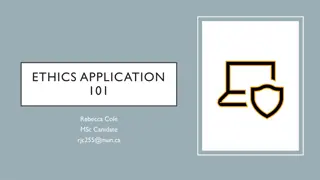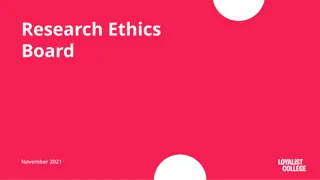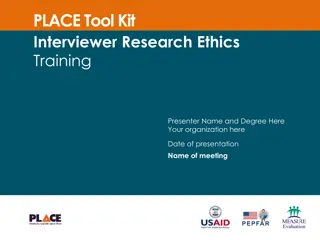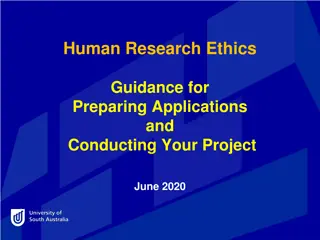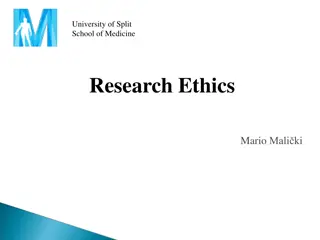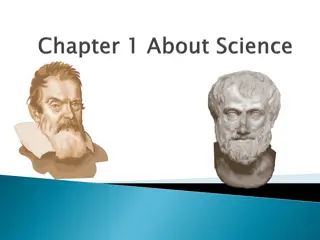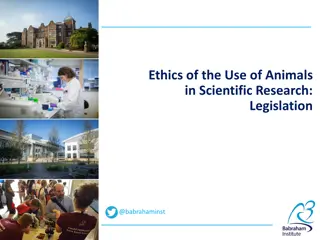Group Ethics in Scientific Research
Delve into the intricacies of fabrication, plagiarism, authorship, and reporting in scientific research settings, exploring issues like irreproducibility, misconduct, the allocation of credit, and whistleblowing. Understand the complexities faced by researchers, including the pressure to produce results, the impact of fraudulent practices, and the ethical considerations surrounding the dissemination of research findings.
Download Presentation

Please find below an Image/Link to download the presentation.
The content on the website is provided AS IS for your information and personal use only. It may not be sold, licensed, or shared on other websites without obtaining consent from the author.If you encounter any issues during the download, it is possible that the publisher has removed the file from their server.
You are allowed to download the files provided on this website for personal or commercial use, subject to the condition that they are used lawfully. All files are the property of their respective owners.
The content on the website is provided AS IS for your information and personal use only. It may not be sold, licensed, or shared on other websites without obtaining consent from the author.
E N D
Presentation Transcript
Ny Group exercise 1: Fabrication Irreproducibility, misconduct, and faked results: https://retractionwatch.com/2022/06/09/chemistry-group-at-hokkaido- up-to-three-retractions/#more-125061 https://www.global.hokudai.ac.jp/blog/results-of-investigation-into- misconduct-in-research-activities/ https://www.japantimes.co.jp/news/2023/09/21/japan/science- health/hokkaido-university-fabricated-data/ https://www.aapsnewsmagazine.org/aapsnewsmagazine/articles/2022/ may22/publications-may22 https://pubs.acs.org/doi/10.1021/cen-09832-scicon7 https://www.science.org/doi/10.1126/science.abc8320/ - Is the pressure too hard? - Do you want to satisfy the supervisor? - Do all co-authors have responsibility? - What do you think should have happened with the supervisor? - Which could be the consequences?
Group exercise 2: Plagiarism Stealing ideas and results: N Am J Med Sci. 2015 Feb; 7(2): 77 80., doi: 10.4103/1947-2714.152084 https://retractionwatch.com/2018/01/15/meet-scientist-whose-ideas-stolen- least-three-times/ https://onlinelibrary.wiley.com/doi/10.1002/stvr.1533 - In which situations is it acceptable to use other person s results? When they have been published? When they have been reported at a conference with published abstracts? When they have been reported at an informal seminar? - Open discussion about research results is desirable but is it possible? - Can other person s results be stolen unconsciously? - How to protect against plagiarism?
Group exercise 3: Authorship Who is responsible and who should get the credit: Authorship and the allocation of credit http://www.the-scientist.com/?articles.view/articleNo/32287/title/ All-s-Not-Fair-in-Science-and-Publishing/ https://www.nature.com/nature-portfolio/editorial-policies/authorship http://sciencecareers.sciencemag.org/career_magazine/previous_issues/article s/2010_04_16/caredit.a1000039 - Who made the discovery? - Who should be awarded? - Who should be the authors of a paper, and which should be their order?
Group exercise 4: Reporting Whistle blowing, reporting, correction, and consequences: http://www.sciencemag.org/news/2017/12/researcher-swedish-fraud-case- speaks-out-i-m-very-disappointed-my-colleague http://www.sciencemag.org/news/2016/12/misconduct-allegations-fly-spat- over-paper-microplastics-and-fish-larvae http://science.sciencemag.org/content/early/2016/11/30/science.aah6990 Science 30 MARCH 2018 VOL 359 ISSUE 6383 1443 A secure procedure: https://doi.org/10.1186/s40504-020-00110-6 - Who should take action? - Which is your responsibility? - What happens to the whistle blower the secure procedure as a solution? - Do scientists protect each other? - How do journals react? - Does the scientific community want to hide such events?
Group exercise 5: Preventing Prevent better than cure but how to prevent? N. Mejlgaardet al., Research integrity: nine ways to move from talk to walk, Nature 2020, 586, 358 360 D. S. Kornfeld, Research Misconduct: The Search for a Remedy, Academic Medicine, 2012, 87, 877 882 - What can be done to prevent misconduct? By research councils, academies, journals/editors, universities, research groups, individual scientists? - Does a course in research integrity help? To whom should such courses be given? Undergraduate students? PhD students? Faculty/Supervisors? - What do you think KTH should do?




